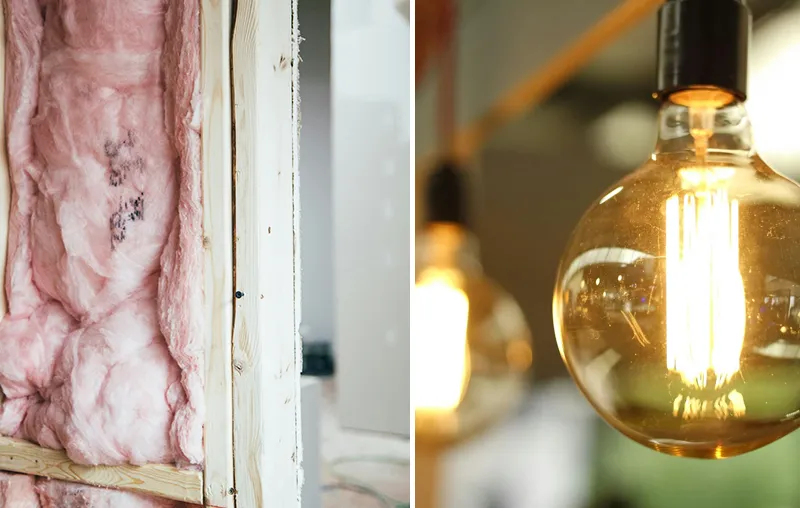Wie lässt sich die Energieeffizienz im Eigenheim verbessern? Wenn du eine klare Antwort auf diese Frage suchst, bist du hier genau richtig! Die Energieeffizienz beschreibt grundsätzlich das Verhältnis zwischen dem Energieeinsatz und dem erzielten Nutzen. Je weniger Energie eingesetzt werden muss, um den gewünschten Nutzen zu erzielen, desto effizienter ist die Handlung schlussendlich.
Vergleichbar wird das Ganze dann durch die Einteilung des Endenergieverbrauchs in Energieeffizienzklassen von A+ (höchste Effizienz) bis H.
In times of the Climate change und der Energiewende versuchen natürlich immer mehr Menschen, energieeffizienter zu handeln. Neben dem Environmental awareness, spielen häufig auch Kostenaspekte oder das Streben nach einem komfortableren Wohnraum eine große Rolle dafür.
In diesem Artikel möchte ich dir jetzt wertvolle, praktische Tipps vorstellen, mit denen du dein Haus energieeffizienter machen kannst. Auf geht's!
Vorteile: Warum sollte man die Energieeffizienz von Häusern verbessern?
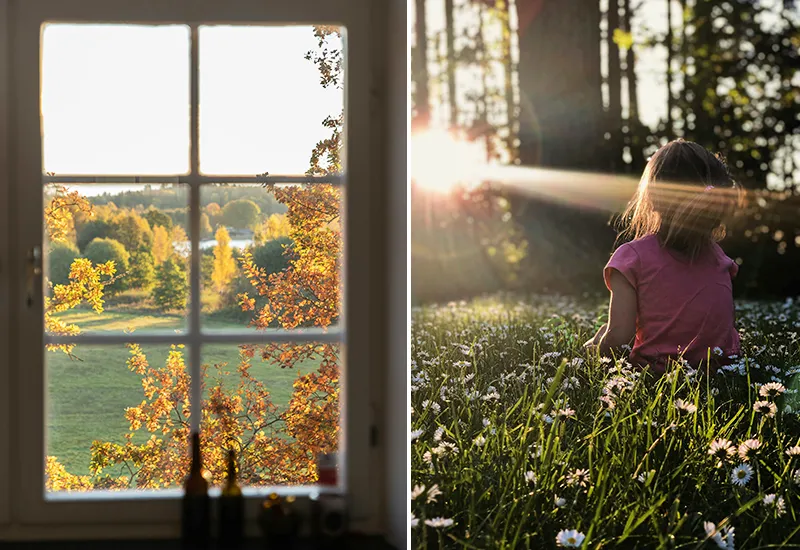
Improving the energy efficiency of your home has numerous benefits, some of which I have already touched on in the introduction. Here I try to alle motivierenden Gründe once again.
By making your home more energy efficient, you can reduce your Reduce energy costs and so Save money sustainably. Ein geringerer Energieverbrauch sorgt also für Stromrechnungen, bei deren Anblick dir nicht die Kinnlade herunterfällt.
Außerdem trägst du zum Protecting our environment und der Bekämpfung des Klimawandels bei bei. Durch den geringeren Energieverbrauch verringert sich nämlich auch dein CO2-Fußabdruck. Zudem steigert ein Efficiency house or an energy-efficient house ultimately also your Living comfort. Beispielsweise sorgt eine gute Isolierung dafür, dass es im Winter schön warm und im Sommer angenehm kühl bleibt.
Die Gründe für ein Energieeffizienzhaus oder entsprechende Modernisierungsmaßnahmen liegen letztlich aber nicht nur in der direkten Kosteneinsparung, in der Umweltschonung und dem gesteigerten Wohnkomfort: auch die Maintaining the value of the property wird gefördert, sodass jede energetische Investition auch eine Investition für deine finanzielle Zukunft ist.
Here I have you die genannten – und auch noch einige weitere – Gründe für die Verbesserung der Energieeffizienz deines Eigenheims noch einmal übersichtlich zusammengestellt:
- Save costs
- Protect the environment and conserve resources
- Improve living comfort
- Increasing the value of property
- Gesundheit fördern und live healthy
- Gesetzliche Anforderungen erfüllen
- Zukunftssicherheit gewährleisten
- Abhängigkeit von fossilen Brennstoffen reduzieren
- Contribute to climate protection (tips at Stop climate change)
- Von Fördermitteln und anderen finanziellen Anreize profitieren
10 Tipps: Wie lässt sich die Energieeffizienz eines Gebäudes steigern?
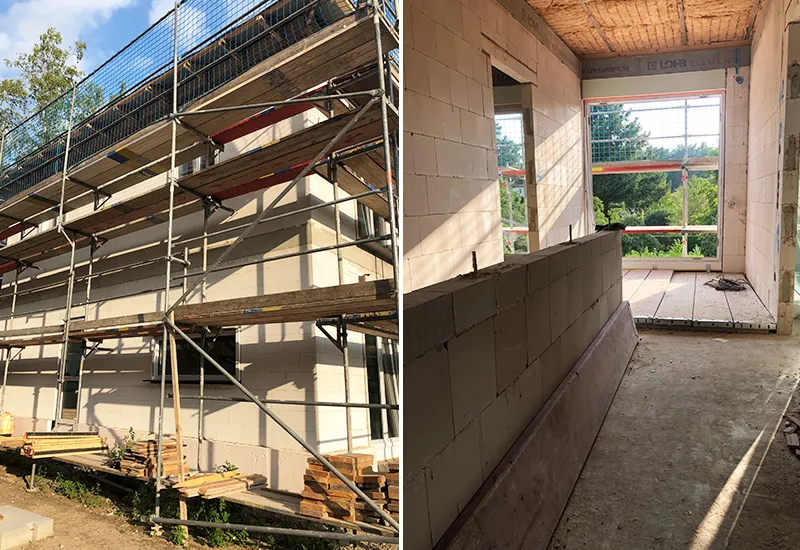
Es ist wirklich wichtig zu verstehen, dass jeder Schritt zur Verbesserung der Energieeffizienz im Eigenheim ein Schritt in Richtung einer nachhaltigeren Zukunft ist – und dass jeder dieser Schritte eine Investment and no expenditure is.
What you can do specifically, um die Energieeffizienz zu erhöhen, möchte ich dir jetzt anhand der folgenden Tipps mit auf den Weg geben. Viel Spaß und Erfolg bei der Umsetzung!
1. Fassade richtig dämmen
Die Dämmung deiner Hausfassade zählt sicher zu den wichtigsten Tipps für eine höhere Energieeffizienz von Gebäuden. Eine schlecht isolierte Fassade kann nämlich zu hohen Wärmeverlusten führen, besonders in den kalten Monaten des Jahres.
Here are a few things you should know if you want to improve your façade effectively and umweltfreundlich dämmen want:
- Material selection: Setze auf natürliche Dämmmaterialien, wie Holzwolle, Flachs, Zellulose oder Hanf. Jedes Material hat dabei seine eigenen Vor- und Nachteile hinsichtlich Wärmeleitfähigkeit, Feuchtigkeitsbeständigkeit und Umweltverträglichkeit.
- Dämmtechniken: Es gibt unterschiedliche Techniken zur Fassadendämmung, wie z.B. die vorgehängte, hinterlüftete Fassade (VHF), das Wärmedämmverbundsystem (WDVS) oder die Innendämmung.
- Berücksichtigung von Fenstern und Türen: Beim Dämmen deiner Fassade darfst du Fenster und Türen nicht außer Acht lassen. Wenn sie in die Jahre gekommen sind, stellen sie oft Schwachstellen in der Außenhülle deines Hauses dar.
- Professional installation: Die korrekte Umsetzung der Wärmedämmung ist entscheidend für ihre Wirksamkeit. Suche dir also geschulte Expert:innen, die dich dabei unterstützen. (z.B. in Form einer Bauherrenberatung)
- Kosten und Förderungen: Die Kosten für die Fassadendämmung können je nach Umfang des Projekts und den gewählten Materialien variieren. Es gibt jedoch oft staatliche oder regionale Förderprogramme (z.B. von der KfW), die die Investition in eine bessere Energieeffizienz unterstützen. Informiere dich deshalb unbedingt vor (!!!) Beginn der Baumaßnahmen über verfügbare Fördermittel und Zuschüsse.
2. Alte Fenster und Türen austauschen
Wie erwähnt, können alte, undichte Fenster und Türen die Energieeffizienz entscheidend negativ beeinflussen. Replace them with modern, energy-efficient windows, wenn du die Möglichkeit dazu hast.
In particular im Verbund mit einer guten Fassadendämmung und einem adäquaten Lüftungsverhalten können moderne Fester, beispielsweise mit Dreifachverglasung, etwaige Wärmeverluste und den Energieverbrauch der Heizung deutlich reduzieren. Sie sind deshalb ein wichtiger Meilenstein auf dem Weg zu einem besonders energieeffizienten Haus.
3. use renewable energies
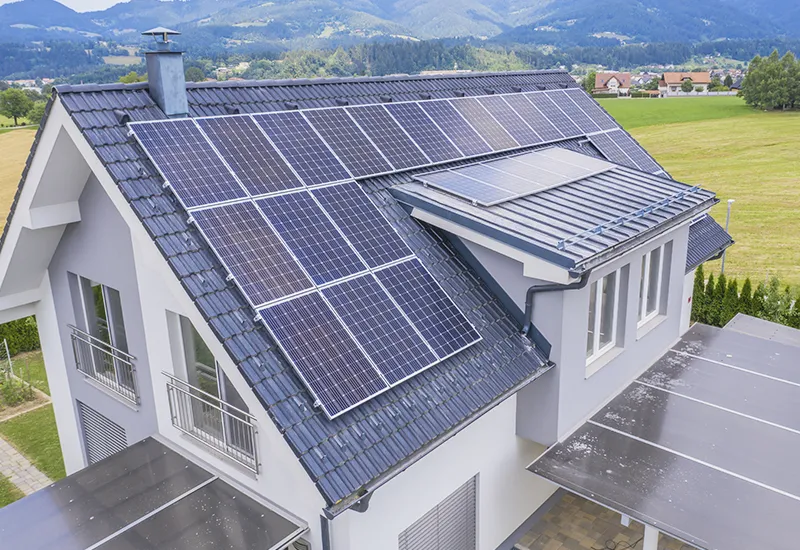
The installation of a photovoltaic system or solar thermal energy lässt sich nicht nur die Energieeffizienz deines Hauses verbessern, sondern auch deine Abhängigkeit von konventionellen Energiequellen (z.B. Kohle, Erdöl und Erdgas) reduzieren.
Die Solarpanele werden dafür mounted on the roof und erzeugen vor allem an sonnigen Tagen große Mengen an grünem Strom aus erneuerbaren, natürlichen Quellen. Falls dir die Investition aktuell zu kostenintensiv ist, kann beispielsweise auch schon ein Balkonkraftwerk ein günstigerer und guter Anfang sein.
4. renew the heating system
Eine veraltete Öl- oder Gasheizung kann ein echter Energiefresser im eigenen Zuhause sein. Um deine Heizkosten zu senken und die Umwelt zu schonen, ist es daher ratsam, auf eine effizientere Heizungsanlage, wie zum Beispiel eine moderne Heat pump, umzusteigen. Sie gewinnt die Wärmeenergie für das Heizen und für Warmwasser aus dem Erdreich.
Good to know: Mit einer PV-Anlage auf dem Dach kannst du schlussendlich auch den Strombedarf für die Wärmepumpe decken. Eine großartige Kombination für eine hohe Energieeffizienz.
5. Auf eine Lüftungsanlage mit Wärmerückgewinnung setzen
Eine zentrale Lüftungsanlage mit Wärmerückgewinnung supplies your entire house with fresh air at all times. Und zwar ohne, dass Wärme verloren geht. Sie belüftet das gesamte Gebäude und hat dabei auch selbst nur einen Extremely low energy requirement. Deshalb stellt die Installation einer solchen Anlage eine wirkungsvolle Maßnahme dar, um die Energieeffizienz deines Hauses gezielt zu erhöhen.
Good to know: Wer eine zentrale Lüftungsanlage hat, muss im Grunde gar nicht mehr die Fenster zum Lüften öffnen, da das Indoor climate stets gesund und angenehm ist. Und falls du doch das Bedürfnis hast, solltest du 1-2 Mal am Tag für einige Minuten Stoßlüften, anstatt stets das Fenster auf Kipp zu stellen. Auch auf diese Weise lohnt sich der Energieeinsatz im Verhältnis zum Nutzen wieder ein bisschen mehr.
6. working with intelligent building technology
Even if many Smart home technologies eher in die Abteilung „Spielerei“ gehören, gibt es auch einige sinnvolle Anwendungen, die die Energieeffizienz verbessern können.
In this respect, smart Thermostats zu nennen, die die Heizung nur dann laufen lassen, wenn sie auch wirklich nötig ist. So reagieren sie zum Beispiel mit Temperaturanpassungen auf deine An- und Abwesenheit.
Tip: Ein ganz ähnliches Prinzip verfolgen Bewegungsmelder, die das Licht (z.B. im Garten) nur dann einschalten, wenn es wirklich jemand braucht. Durch die Installation kannst du Strom sparen und schlussendlich auch der Light pollution durch die Außenbeleuchtung entgegenwirken.
7. Dach richtig dämmen
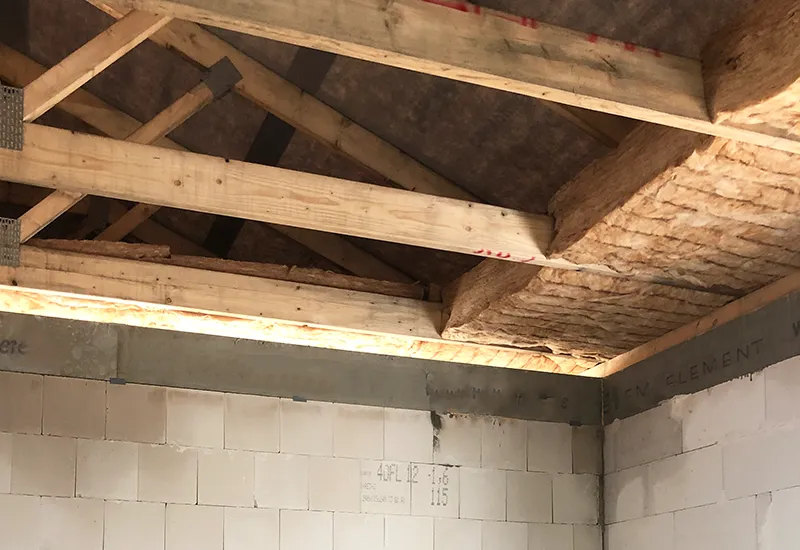
Nicht nur über die Fassade, sondern auch über das Dach kann ein schlecht isoliertes Haus viel Wärme nach Außen verlieren. Mit einer effizienten Dachdämmung kannst du dieses Problem definitiv lösen!
Der Ausbau und die Dämmung des Dachbodens ist auch bei neuen Häusern nicht immer eine Selbstverständlichkeit – manchmal wird auch „nur“ die obere Decke gedämmt.
Tip: Dämmen solltest du auch die Kellerdecke! Die Kälte aus dem Keller findet nämlich immer einen Weg in die darüber liegenden Wohnräume, sodass die aufwendig erzeugte, angenehme Wärme schwindet. Wenn du energieeffizienter wohnen und keine kalten Füße bekommen willst, solltest du auch an dieser Stelle handeln.
8. install water-saving fittings
Through the use of water-saving fittings you not only reduce water consumption in your household! Du sparst auch die Energie, die zur Erwärmung des Wassers benötigt wird. Klingt logisch, oder? So hast du einen vergleichbaren Nutzen, bei einem geringeren Energieeinsatz – und damit eine weitere Maßnahme für eine höhere Energieeffizienz kennengelernt.
9. Effiziente Haushaltsgeräte bevorzugen
Ich persönlich verbinde die bunte Übersicht der Energieeffizienzklassen immer mit großen Haushaltsgeräten, wie Kühlschränken, Waschmaschinen, Wäschetrocknernbut also with televisions. Du auch? So oder so solltest du beim Kauf neuer Geräte stets die bevorzugen, die sich durch eine hohe Energieeffizienz auszeichnen.
Even if Geräte der Klasse A+++ oder A++ zwar etwas kostspieliger in der Anschaffung sein mögen, sparen sie dir langfristig Energie und damit Kosten. Halte also gezielt Ausschau danach, wenn mal wieder eine Neuanschaffung ansteht.
Good to know: The energy efficiency classes have been reorganized a few years ago. Auch ein modernes A oder B kann mittlerweile sehr energieeffiziente Geräte auszeichnen.
10. conscious use of resources
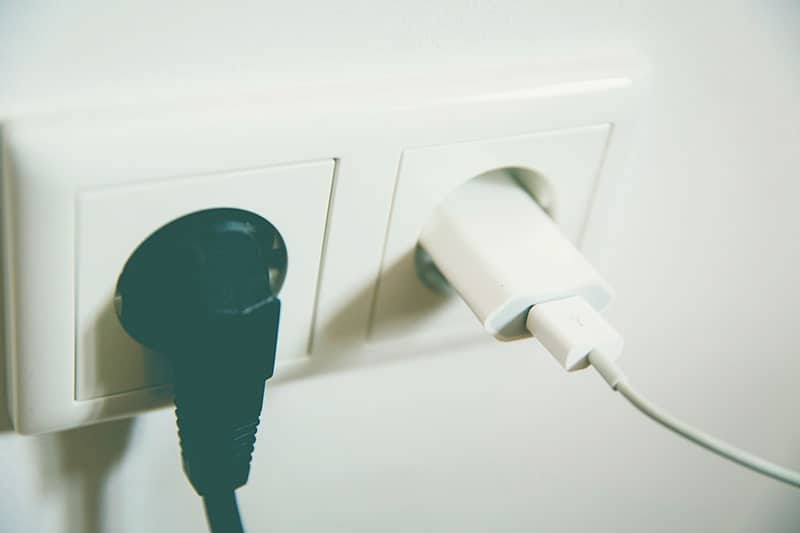
Wie eingangs erwähnt, beschreibt Energieeffizienz das Verhältnis zwischen dem Energieeinsatz und dem erzielten Nutzen. Doch Einsatz und Nutzen dürfen durchaus auch mal hinterfragt werden. Denn in vielen Fällen des Alltags ist unser Energieverbrauch absolut unnötig.
Conscious Save electricity, hat vielleicht keinen direkten Einfluss auf die Effizienz, ist aber dennoch entscheidend für die Reduzierung deines absoluten Energiebedarfs in Zeiten der Energiewende. Und glücklicherweise ist die Umsetzung auch ziemlich einfach!
Here are 6 Kurz-Tipps für dich, um sparsamer und wertschätzender mit Energie umzugehen and save your wallet at the same time:
- Use energy-saving lamps and LED lights zur Beleuchtung – am besten mit Bewegungsmelder.
- Lasse deine Heizungs- und Kühlsysteme regelmäßig wartento maximize their efficiency.
- Cook with the lid on the pot, when you boil water, for example.
- Wash clothes and dishes with cold water, um den Energieverbrauch für Warmwasser zu senken. (Zusatz-Tipp: Cold shower)
- Taue deinen Kühlschrank und deine Gefriertruhe regelmäßig ab.
- Lasse natürliches Tageslicht herein and switch off your lights.
Energieeffizienz verbessern – ein Gewinn für alle!
Increasing the energy efficiency of your home is a Important step, um Kosten zu senken und natürliche Conserving resources in everyday life. In the end, everyone benefits: you, the environment and our society.
With the tips above, you can now start to improve your Zuhause Schritt für Schritt energieeffizienter zu gestalten. Du musst sie aber nicht alle auf einmal umsetzen. Schließlich kostet so manche Maßnahme auch wirklich viel Geld. Sei dir stattdessen bewusst, dass jede noch so kleine Verbesserung zählt.
"What we do today will determine what the world looks like tomorrow."
Marie von Ebner-Eschenbach (more at Environmental protection quotes)
Hast du Fragen, Anregungen oder weitere Tipps für eine höhere Energieeffizienz im Eigenheim? Dann freue ich mich auf deinen Kommentar!
Stay efficient,

PS: Eine höhere Energieffizienz in deinem Zuhause verringert auch deinen ökologischen Fußabdruck. Was du ansonsten noch tun kannst, zeige ich dir als Nächstes gern im verlinkten Blogbeitrag.

